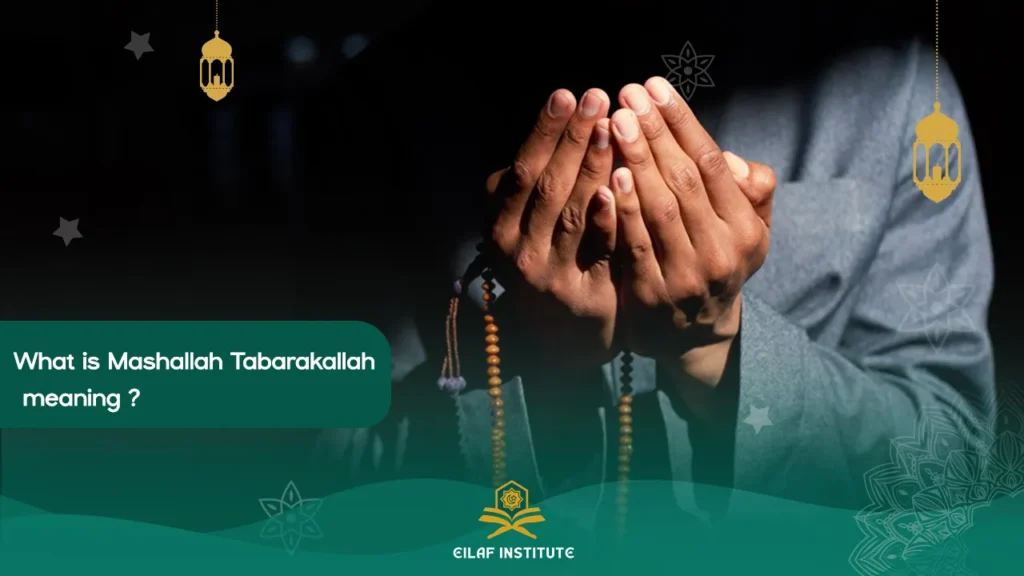Mashallah Tabarakallah (ما شاء الله تبارك الله) is a powerful Arabic expression of praise and recognition. It combines two phrases that mean, “What Allah has willed” and “Blessed is Allah.” Together, they are used to express admiration, gratitude, or joy for a blessing while acknowledging that all goodness comes from God. Many Muslims also say it as a form of protection against envy or the evil eye.
But what is Mashallah Tabarakallah meaning in full, and when should it be used? This guide explains its linguistic meaning, spiritual depth, and proper usage.
What Is Mashallah Tabarakallah Meaning?
To understand What Is Mashallah Tabarakallah Meaning, it is helpful to examine each part individually before looking at the combined phrase.
In Arabic, the full expression appears as:
ما شاء الله تبارك الله
This is commonly written in English as mashallah tabarakallah, masha allah tabarakallah, or ma sha allah tabarakallah in Arabic. While spellings vary in transliteration, the meaning remains the same.
The Meaning of “Mashallah” (ما شاء الله)
The phrase Mashallah (ما شاء الله) literally means:
“What Allah has willed.”
The core mashallah tabarakallah meaning begins with acknowledging divine will. When a person says Mashallah, they are recognizing that whatever beauty, success, talent, or blessing they see exists only because Allah willed it to exist.
For example, if someone sees a beautiful home, a healthy child, or a personal achievement, saying Mashallah affirms that the blessing is not purely the result of human effort, but ultimately a manifestation of God’s will.
This expression reinforces humility and removes arrogance. It shifts credit from human ability to divine decree.
The Meaning of “Tabarakallah” (تبارك الله)
The second part, Tabarakallah (تبارك الله), translates to:
“Blessed is Allah”
or
“May Allah bless it.”
The tabarakallah meaning conveys reverence and invokes blessing. Linguistically, the root word implies greatness, abundance, and divine blessing.
When someone says Tabarakallah, they are praising Allah’s perfection and asking that the admired blessing continue and remain protected.
So while Mashallah acknowledges the source of the blessing, Tabarakallah includes an implicit supplication for its preservation.
The Combined Meaning: Masha Allah Tabarakallah Meaning in English
When combined, masha allah tabarakallah meaning in English can be understood as:
“What Allah has willed has occurred, and blessed is Allah (may He bless it).”
This complete phrase expresses three essential elements:
- Recognition of divine will
- Praise of Allah
- A subtle prayer for continued blessing and protection
This is the comprehensive answer to What Is Mashallah Tabarakallah Meaning. It is both praise and supplication within a single statement.
Mashallah Tabarakallah in Arabic With Harakat
For learners of Arabic, the phrase written with full vowel markings (harakat) appears as:
مَا شَاءَ ٱللَّهُ تَبَارَكَ ٱللَّهُ
Understanding masha allah tabarakallah in Arabic with harakat helps with correct pronunciation and recitation.
When Should You Say Mashallah Tabarakallah?
Understanding the meaning clarifies when to use this phrase appropriately.
1. When Admiring a Blessing
If you see something beautiful or impressive, such as a child’s achievement, a successful project, or a new home, saying mashallah tabarakallah acknowledges that the blessing comes from Allah.
2. When Giving a Compliment
Instead of offering praise that centers only on a person’s effort, adding Mashallah Tabarakallah turns the compliment into both praise and prayer.
For example:
- “Mashallah Tabarakallah, your work is excellent.”
- “Mashallah Tabarakallah, what a beautiful family.”
3. When Celebrating Personal Success
If you receive good news or accomplish a goal, saying the phrase expresses gratitude and humility. It prevents pride and reminds the speaker that success ultimately comes from God.
4. For Protection Against the Evil Eye
Islamic tradition acknowledges the reality of envy (hasad) and the evil eye (‘ayn). Many scholars explain that saying Mashallah when admiring something helps prevent harm that may arise from unintended envy.
By attributing the blessing to Allah and invoking His protection, the phrase acts as a spiritual safeguard.
The Spiritual Benefits of Saying Mashallah Tabarakallah
Knowing mashallah tabarakallah meaning is not only linguistic knowledge, but it carries spiritual value.
A Reminder of Tawhid (Oneness of God)
The phrase reinforces Tawhid, the central Islamic belief that Allah alone is the ultimate source of all power and blessing. Every time you say it, you affirm divine sovereignty.
Cultivates Gratitude
Regularly saying mashaallah tabarakallah arabic expressions fosters a mindset of appreciation. It reminds believers that every blessing, large or small, is a gift.
Encourages Humility
Because the phrase attributes success to Allah’s will, it reduces arrogance and self-importance.
Strengthens Social Harmony
When used in community settings, the phrase transforms admiration into goodwill. It prevents resentment and encourages positive interaction.
Final Reflection
Understanding What Is Mashallah Tabarakallah Meaning deepens both language knowledge and spiritual awareness. The phrase combines recognition of divine will, praise of Allah, and a prayer for continued blessing.
Whether expressed as mashallah tabarakallah in Arabic, masha allah tabarakallah, or another transliteration, its purpose remains the same: to acknowledge that every blessing originates from Allah and to ask for His protection.
Incorporating this expression into daily life transforms simple admiration into an act of faith, gratitude, and humility.
FAQ
Is Mashallah Tabarakallah mentioned in the Qur’an?
The expression “Mashallah” appears in the Qur’an (Surah Al-Kahf 18:39), where a believer is advised to acknowledge blessings by saying, “What Allah willed.” The wording reinforces the principle of attributing blessings to divine will.
Is it mandatory to say it?
It is not obligatory, but it is highly recommended when admiring something positive.
Can non-Arabic speakers say it?
Yes. Even if pronunciation is not perfect, the intention and meaning remain valuable.

